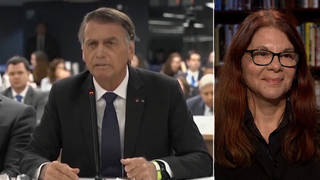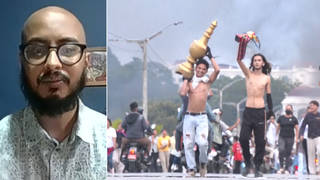
Guests
- Jeff Mastersco-founder and director of meteorology for Weather Underground, a weather information website. He posts his writings at Wunderblog.
Wildfires across Russia. Devastating floods in Pakistan. Deadly landslides and flash floods in India and China. Heat wave across the United States. Severe drought in Niger. Taken together, scientists warn the events match predictions for extreme climate events caused by global warming. This year is on track to be the warmest since reliable temperature records began over a century ago, mainly due to a buildup of greenhouse gases from fossil fuels. We speak to Jeff Masters, co-founder and director of meteorology for Weather Underground, a weather information website. [includes rush transcript]
Transcript
AMY GOODMAN: Wildfires across Russia. Devastating floods in Pakistan. Deadly landslides and flash floods in India and China. Heat waves across the United States. Severe drought in Niger. Taken together, scientists warn they could match predictions for extreme climate events caused by global warming. This year is on track to be the warmest since reliable temperature records began over a century ago, mainly due to a buildup of greenhouse gases from fossil fuels. That’s according to the UN World Meteorological Organization.
In Moscow, the heat has doubled the daily death rate. This is Andrei Seltsovsky, the head of Moscow’s health department.
ANDREI SELTSOVSKY: [translated] The average death rate in the city during normal times is between 360 to 380 people a day. Today, we have around 700. This is no secret. Everyone thinks we are trying to keep it secret. Look, it is 40 degrees Celsius on the street.
AMY GOODMAN: Over 1,600 have been killed by the floods in Pakistan, and landslides have killed over 300 in China. The estimated damage to homes, infrastructure and crops caused by the wildfires and the floods amounts to billions of dollars. And in Russia, among the world’s largest exporters of wheat, all future grain exports have been banned for the rest of the year.
Well, we begin today with an overview of the extreme weather events in countries around the world. Dr. Jeff Masters is co-founder and director of meteorology for Weather Underground, a weather information website — his latest post is about the heat wave in Russia — joining us now from Ann Arbor, Michigan.
Welcome to Democracy Now! Dr. Masters, talk about, first, what is happening in Russia.
DR. JEFF MASTERS: Well, in Russia, they’re getting a heat wave unlike anything that’s ever been recorded in that country. Certainly going back the last 130 years, when we had good records, and then probably going back as much as a thousand years, if you look at the historical records, there has never been heat like this in Moscow and over this huge area of Russia. To give you some idea of what we’re talking about, back in 1920, Russia recorded its highest temperature in Moscow on record, 99 degrees Fahrenheit. That record has been broken five times just in the past two weeks. So this is unprecedented heat, not only for Moscow, but for a huge region of Russia and some neighboring countries, as well.
AMY GOODMAN: And talk about the effects in Russia from wildfires to what we’re seeing, what, more than 300 more deaths in Moscow alone a day as a result of the heat, that also leads to terrible problems of pollution.
DR. JEFF MASTERS: Yeah, the combined effects of heat and then air pollution and then smoke from fires is a terrible killer. We saw in 2003, when we had a similar heat wave over France and most of Europe, the death toll reached over 40,000. And I think in Russia we’re going to be seeing death tolls certainly in the tens of thousands from this heat wave, as well. The smoke, in particular, is causing a tremendous hardship on the people, and the elderly, in particular, in Russia.
AMY GOODMAN: Talk about the rest of the world, Dr. Masters.
DR. JEFF MASTERS: OK. Well, the entire world, if you look at the past six months, has experienced its warmest year on record, going back to the late 1800s when we first started making measurements. And so, it’s not a surprise that we might be seeing record heat waves and record high temperatures being set. In fact, there are seventeen countries in the world that have set their extreme all-time heat record this year. And that’s the most we’ve ever seen. The previous time was back in 2007, when fifteen countries set their all-time heat record. And those heat records this year include a 128-degree Fahrenheit reading in Pakistan, which is the highest temperature ever reliably recorded in the entire continent of Asia. So there’s been heat all over the globe. The ocean temperatures have been at record warm levels this year, and including in the Tropical Atlantic, where we’re expecting a severe hurricane season. So, it’s heat, heat, heat, is the name of the game this year on planet earth.
AMY GOODMAN: July 2010 was the sixth-straight record warm month in the Tropical Atlantic and had the third-warmest anomaly of any month in history. What does that mean?
DR. JEFF MASTERS: Well, when you get those kind of sea surface temperatures, it provides extra energy for hurricanes, which is what we’re most worried about, because hurricanes are heat engines. They suck heat out of the ocean, and they convert that heat to the energy of their winds. So we’re expecting at least double the usual number of intense hurricanes this year, the ones that are most likely to do high levels of damage. And the other thing all that heat does, if it’s down in the Caribbean, where a lot of it is, is it causes coral mortality. You get bleaching episodes where you’ll kill a large amount of coral. And back in 2005, the last year we had temperatures this warm in the Tropical Atlantic, we had a massive die-off of coral, particularly in the Virgin Islands and some of the neighboring islands.
AMY GOODMAN: Jeff Masters, talk about the United States.
DR. JEFF MASTERS: Well, in the US, we’ve had some heat waves here, as well. It’s particularly in the South that we’ve had some daily records set. And as a rule, though, we haven’t gotten the extreme heat that has been seen in other parts of the world, back in — over in Asia and Africa and Europe. So the US has kind of lucked out this year. I mean, it’s been hot, but we haven’t had severe drought or extreme heat waves like have been experienced in other parts of the world. Certainly, if we would have had the kind of weather that Russia is experiencing, it would have been an all-time record heat wave for this country, and probably been the worst natural disaster in American history.
AMY GOODMAN: The Asian southwest monsoon, exceptionally deadly this year, what countries, what areas, regions of the earth, did it affect?
DR. JEFF MASTERS: Well, primarily Pakistan, where they had the worst flooding in that country’s history, but also neighboring areas of India, along Kashmir, and then China, where over 700 people are dead today in a landslide that was triggered by heavy monsoon rains. Afghanistan, as well, has seen heavy monsoon rains. So it’s been an exceptional year for the monsoon. And I think part of that is due to the fact that the temperatures have been so warm in that area. I mean, we’ve seen record heat in Asia this year. And when you have a very warm atmosphere, you can evaporate more water vapor into it, which potentially can cause more flooding. And, in fact, if you look at the past few decades, the amount of heavy precipitation events in the Indian monsoon has increased substantially. We’ve seen almost a doubling in some of these very heavy rainfall events. Although the total amount of water falling down has not changed much, it’s these extreme events that have increased, and that’s in line with what climate prediction models are showing will continue to happen this century as the climate warms.
AMY GOODMAN: The ice island that broke off of Greenland that’s four times the size of Manhattan, can you talk about the significance of this?
DR. JEFF MASTERS: Well, that particular ice island broke off the northern coast of Greenland, where we haven’t really seen this kind of effect before. And what’s going on is that the temperatures in Greenland over the past decade have been very, very warm. And particularly over North Greenland this year, we’ve seen some very warm temperatures that have caused substantial melting of some of these glaciers and made them more vulnerable to large icebergs calving off of them. So, it’s just kind of a continuation of the warm pattern we’ve seen up there in the Arctic over the past few decades.
AMY GOODMAN: What is the connection between all of this extreme weather and climate change, global warming, Jeff Masters?
DR. JEFF MASTERS: Well, what we’re seeing this year is a preview of things to come. As the earth continues to warm, we’re going to see more extreme precipitation events, we’re going to see more heat waves, and this year is kind of a foretaste of that. Now, not every year is going to be like this. For instance, if you look at last year, it was a relatively quiet year as far as natural disasters go. The amount of dollars paid by the insurance companies was below average. But we’re going to start seeing more and more years like this year when you get these amazing events that cause tremendous death and destruction.
And the concern I have is that as this extreme weather continues to increase in coming decades and the population increases, the ability of the international community to respond to these disasters and provide aid to victims is going to be stretched to the limit, and we’re not going to be able to respond. And we’re going to get in a situation where there’s going to be global emergencies that continue year after year all across the countries, and we’re just going to be struggling to cope with that.
AMY GOODMAN: Finally, Jeff Masters, explain what Weather Underground is and what you feel about — I mean, there is tremendous amount of weather reported in the corporate media, in the mainstream media, all the time. People tune in constantly for it. It’s more and more frequent, because it affects people’s lives. And yet, you rarely hear the words “global warming” put together with extreme weather, so there’s no sense anyone can do anything about it.
DR. JEFF MASTERS: Well, you can put those words together with extreme weather. You have to talk a little bit carefully about it, because no single event can be blamed on climate change or global warming. But what I like to say sometimes is that we load the dice in favor of more extreme events. And perhaps it’s a better analogy to say we’re putting more spots on the dice. It used to be, when you roll the dice, you’d get snake eyes or you’d get double sixes. But I think now, particularly when we’re talking about extreme temperature events, where there’s more spots on the dice, you can’t roll snake eyes anymore, but you can roll a thirteen. And that’s what happened to Russia this year; they rolled a thirteen. I don’t think that kind of event was possible until recent decades, because global warming increased the baseline temperature of the world. So, I talk all the time about global warming and say, you know, we have to be cognizant of the fact that global warming is making heavy precipitation events and extreme heat waves more likely. Can’t say this particular heat wave is to blame for it, but, boy, it sure is going to be more and more the case, as the decades go on, we’ll see these type of events.
AMY GOODMAN: Would you call on your fellow weathermen and women — I mean, there are conferences, I presume, that you go to where all of you are talking — to start making this link in the mainstream media when they do their news reports?
DR. JEFF MASTERS: Well, I do talk to some of these people, but most of them don’t go to the scientific conferences. They tend to stay in their TV studios and look at their own data. I think there’s a disconnect between the research community and TV meteorologists. And a lot of TV meteorologists are very skeptical that human-caused global climate change is real. They’ve been seduced by the view pushed by the fossil fuel industry that humans really aren’t responsible. And you can come up with all kinds of excuses — I’m sure you’ve heard them all — that, you know, climate scientists are doing it for — you know, to get attention and research money, that the temperature record is flawed, because, you know, we’ve got the heat island effect in cities and so on. But all of that is just propaganda that’s been put out by the PR industry of the fossil fuel industry, and it’s convinced a lot of TV meteorologists that that’s the case. So, it’s a tough road here, because we’re fighting a battle against an enemy that’s very well funded, that’s intent on providing disinformation about what the real science says. So, I do my best, but it’s a tough, uphill battle.
AMY GOODMAN: Who is the enemy?
DR. JEFF MASTERS: Well, it’s the PR industry in favor of the fossil fuel interests trying to convince us that global climate change is not real.
AMY GOODMAN: Dr. Jeff Masters, I want to thank you very much for being with us, co-founder and director of meteorology for Weather Underground, an internet weather information service. This is Democracy Now! When we come back, we’re joined by Pablo Solón. He’s Bolivia’s ambassador to the United Nations, just back from climate talk negotiations in Bonn. Stay with us.












Media Options